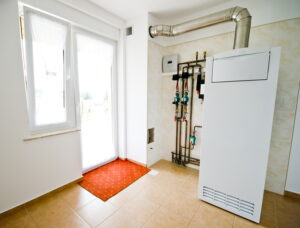A well-functioning boiler is the source of winter heating for many households, providing warmth and comfort during our long winters here in Colorado. Yet, like all appliances, boilers have a finite lifespan. In this blog post, we will explore the life expectancy of modern residential boilers, the factors influencing their longevity, signs indicating it’s time for a replacement, plus practical tips to extend their lifespan. If you need assistance with your boiler, you can rely on our team of licensed HVAC professionals for boiler replacement, boiler installation, and boiler repair in Colorado Springs.
The Life Expectancy of Modern Boilers
Understanding the average lifespan of modern boilers is crucial for homeowners. Generally, residential boilers can last anywhere from 15 to 30 years, but several factors come into play.
Quality of Materials and Manufacturing
- Boilers constructed with high-quality materials tend to have a longer lifespan.
- Well-manufactured units are less prone to premature failures.
Regular Maintenance
- Routine maintenance, including cleaning, inspections, and tune-ups, significantly impacts a boiler’s longevity.
- Neglecting maintenance can lead to accelerated wear and tear.
Boiler Load and Proper Sizing
- Boilers that handle larger heating loads may experience more stress, potentially shortening their lifespan.
- Matching the boiler size to the heating needs of the home is crucial for optimal performance and longevity.
Factors Affecting Boiler Longevity
Water Quality
- Hard water can lead to mineral deposits and corrosion within the boiler, reducing its efficiency and lifespan.
- Implementing water treatment and softening measures is essential for preserving the boiler’s integrity.
Maintenance Practices
- Regular professional inspections and prompt repairs can prevent minor issues from escalating, ensuring the boiler operates efficiently over time.
- DIY installations and repairs may compromise the system, leading to premature failures.
Installation Quality
- Proper sizing and professional installation are critical for a boiler’s performance and lifespan.
- Inadequate installations may result in uneven heating, increased stress on components, and reduced efficiency.
Signs Your Boiler Needs Replacement
- Decline in Efficiency: A noticeable increase in energy bills may indicate declining efficiency, signaling potential issues with the boiler.
- Frequent Repairs: If your boiler requires frequent repairs, it may be a sign that it’s reaching the end of its operational life.
- Unusual Noises: Strange noises such as banging, whistling, or gurgling could indicate underlying issues that may necessitate a replacement.
- Age of the Boiler: Age alone is a factor. If your boiler is approaching or surpassing the average lifespan, replacement should be considered.
- Increase in Energy Bills: A sudden spike in energy bills could indicate reduced efficiency, prompting the need for a new, more energy-efficient boiler.
Tips for Extending Boiler Lifespan
- Regular Professional Maintenance: Schedule annual professional inspections and maintenance to keep your boiler in top condition.
- Monitoring and Addressing Water Quality: Implement water treatment and softening measures to prevent mineral buildup and corrosion.
- Upgrading Outdated Components: Consider upgrading older components to improve efficiency and overall performance.
- Considering Replacement: If your boiler is aging and showing signs of decline, consider proactively replacing it to avoid sudden breakdowns.
Robbins Heating & Air Conditioning serves Colorado Springs and the surrounding area. Arrange for a new boiler installation with us today.

